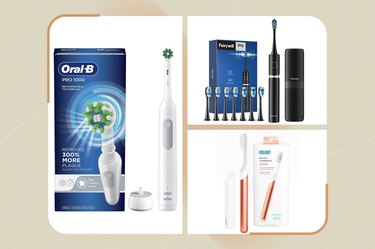
A pink tongue is a healthy tongue, so seeing a white tongue in the mirror can be a jarring sight, especially first thing in the morning. What is that and, more importantly, what does it mean?
Here's what causes a white-coated tongue, how to treat it, how to prevent it and when to see a doctor.
Video of the Day
Video of the Day
Common Causes of a White Tongue
When we say white tongue, we're referring to a white coating on the tongue that's caused by an overgrowth and swelling of the papillae, the little bumps on the surface of the tongue. The white coating you see is actually a combo of bacteria, dead cells and other debris, according to the Mayo Clinic.
A white tongue is often caused by:
- Poor oral hygiene
- Dehydration (especially if the tongue is white and dry or cracked)
- Fever
- Dry mouth
- Mouth-breathing
- Tobacco or excessive alcohol use
- Irritation from teeth or dental appliances
- Diet — eating mostly mashed or soft foods
(These same culprits are often behind a hairy tongue, according to the American Academy of Oral Medicine, although the coating on top of the tongue appears dark instead of white.)
The condition itself is often harmless and goes away on its own with proper care (brushing your tongue regularly, for example). But, in some cases, it could be a sign of a more serious condition.
Does Fasting Cause a White Tongue?
No research specifically links fasting to a white tongue, but you may notice this type of tongue change if you're dehydrated. That's one reason it's important to stay hydrated with water even when you're foregoing food.
Conditions Associated With a White Tongue
A white tongue could also indicate one of the following conditions, according to London-based dentist Mishal Sachdev, MJDF, a specialist in periodontics and implants at Gentle Dental Care Group.
1. Leukoplakia
Leukoplakia occurs when there's an overgrowth of cells in the lining of your mouth, according to the Cleveland Clinic. These cells then combine with a protein your body makes called keratin to create white, raised patches.
"Oral leukoplakia gives rise to white patches not just on the tongue but may also be associated with your cheeks and gum line," Dr. Sachdev says. "Leukoplakia is more prevalent if you smoke or chew tobacco, or excessively consume alcohol. These white patches alone may be totally benign (harmless) but may develop in rare cases into oral cancer."
2. Oral Lichen Planus (OLP)
OLP is a type of rash that can show up on different parts of your body, according to the NHS. It's caused by a kind of short-circuit in your immune system, Dr. Sachdev says, and when it's in your mouth, it can look like white patches on your tongue, gums and/or cheeks.
"In approximately a third of cases, OLP will present in the gums and on the skin in the form of specific rashes," Dr. Sachdev says.
3. Oral Thrush
If your tongue is white and sore, you might be dealing with oral thrush. This is a type of yeast infection caused by the fungus Candida, according to the Centers for Disease Control and Prevention (CDC). Candida normally lives in the mouth at low levels without causing a problem, but certain conditions can lead to an overgrowth and infection that requires treatment.
Dr. Sachdev says you're more likely to get thrush if you:
- Have a weakened immune system (including during pregnancy)
- Have diabetes
- Have an iron or vitamin deficiency
- Wear dentures (especially if they're not cleaned well)
- Take antibiotics
In addition to white patches on the tongue, thrush can show up on the roof of the mouth, inner cheeks and throat, per the CDC. You might also have redness or soreness in the mouth, loss of taste, pain while swallowing or eating and a dry, cotton-like feeling in the mouth.
Can a Vegan Diet Cause a White Tongue?
Going vegan isn't directly linked to this condition. But as Dr. Sachdev notes above, your tongue may go white if you're deficient in iron, which is a concern for people who don't eat animal protein. If you follow a vegan diet and notice changes in your tongue, consider working with a registered dietitian to make sure you're meeting your body's nutrition needs.
4. Syphilis
This is a sexually transmitted infection that often "gives rise to white patches" on the tongue, Dr. Sachdev says.
Other symptoms of syphilis may come and go, per the CDC, and may include:
- Rash
- Fever
- Swollen lymph glands
- Sore throat
- Patchy hair loss
- Headaches
- Weight loss
- Muscle aches
- Fatigue
5. Geographic Tongue
This is a type of tongue discoloration that can show up as red and white patches, where papillae are missing, according to the Mayo Clinic.
"This inflammatory condition is normally harmless, and the papillae loss can appear as smooth, red patches and can make the tongue look topographically like a map," Dr. Sachdev says.
The discoloration can affect the top or sides of the tongue, and the spots will frequently change shape, size and location. It can make the tongue sensitive to spicy, salty or sweet foods.
6. COVID-19
Along with the more common symptoms of COVID-19 — such as fever, cough and shortness of breath, per the CDC — some people may experience "COVID tongue," or white patches on the tongue, according to an August 2021 paper in Case Reports in Dentistry.
However, more research needs to be done to better understand why these changes happen.
How to Treat a White Tongue
A white tongue may not need to be actively treated, Dr. Sachdev says, as symptoms often resolve with time and with proper oral hygiene (read: regular brushing and flossing).
However, some specific treatments depend on the underlying cause:
- Leukoplakia: This condition requires regular dental checkups to make sure it isn't getting worse, but symptoms will generally improve once you cease smoking and/or reduce your alcohol intake, per the Cleveland Clinic. A doctor may also prescribe oral medications or surgery in some cases.
- OLP: OLP usually gets better on its own, but a doctor can prescribe certain mouthwashes and sprays that may help with symptoms, per the NHS.
- Oral thrush: Thrush is usually treated with antifungal medication prescribed by a doctor. Your doctor may also suggest you avoid certain foods, including sugary fare, and add probiotic-rich, unsweetened yogurt to your diet.
- Syphilis: Syphilis is diagnosed via a blood test and can be treated with antibiotics. If left untreated, it can result in organ damage and death, per the CDC.
- Geographic tongue: There's no known cause of geographic tongue, and the issue usually resolves on its own over time.
- COVID-19: If you think you have COVID-19, take care of yourself by resting and drinking fluids, and avoid contact with others. If you have trouble breathing, chest pain, confusion or are having trouble staying awake, seek medical attention immediately.
How to Prevent a White Tongue
The best ways to prevent a white tongue, Dr. Sachdev says, include:
- Keeping hydrated
- Practicing good oral hygiene
- Avoiding smoking and excessive alcohol consumption
When it comes to staying hydrated: Aim to drink about half your body weight in ounces each day. So, for example, if you weigh 180 pounds, aim for about 90 ounces (11 cups) of water.
As for good oral hygiene: Brush your teeth twice a day with a soft-bristled toothbrush, per the American Dental Association. Brushing sessions should last about two minutes each, and don't forget to brush your tongue or use a tongue scraper.
When to See a Doctor
If a white tongue is your only symptom, it will likely go away on its own. But you should see a doctor if you also have any of these symptoms in your mouth, per the Cleveland Clinic:
- Pain
- Itchiness
- Trouble eating or speaking
You should also see a doctor if the white color doesn't go away after a few weeks.
- Mayo Clinic: "White tongue"
- Cleveland Clinic: "White tongue"
- NHS: "Lichen Planus"
- Centers for Disease Control and Prevention: "STD Facts: Syphilis"
- Mayo Clinic: "Geographic Tongue"
- Cleveland Clinic: "Leukoplakia"
- American Dental Association: "Toothbrushes"
- American Academy of Oral Medicine: "Hairy Tongue"
- Centers for Disease Control and Prevention: "Symptoms of COVID-19"
- Case Reports in Dentistry: "Parosmia, Dysgeusia, and Tongue Features Changes in a Patient with Post-Acute COVID-19 Syndrome"
Is this an emergency? If you are experiencing serious medical symptoms, please see the National Library of Medicine’s list of signs you need emergency medical attention or call 911.


